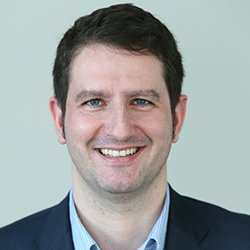14th July 2020
We know artificial intelligence (AI) has the potential to transform the future of healthcare, but how will we take those first steps? Jorge Fernández García, Director of Innovation at EIT Health, outlines the findings from a recently published EIT Health report into the impact of AI on the healthcare workforce and discusses how we can make the ‘healthcare of the future’ a reality.
The mere mention of AI conjures up images of complex apps, data and connected devices. And there may be misconceptions from some in the medical community that health-related AI could replace or displace healthcare professionals (HCPs).

This is a myth that’s quickly dispelled in our new report ‘Transforming healthcare with AI: the impact on workforce and organisations’. It recognises the potential AI has to enrich and refocus the work of healthcare professionals towards what they got into the profession for – direct patient care. AI will facilitate automation of mundane tasks for HCPs who currently spend up to 70 per cent of their time on admin.1
Such solutions are urgently needed, with healthcare workforces already struggling to meet demand. And this pressure will only increase; it’s estimated that by 2050, one in four people in Europe and North America will be over the age of 65 and will potentially have complex and demanding healthcare needs.2 The advances in AI can be of immense benefit here. McKinsey Global Institute analysis highlighted that AI automation could help alleviate workforce shortages, potentially freeing up 10 per cent of nursing activities, for example.1 This is about technology supporting the human face of healthcare, not replacing it.
However, time is not the only benefit. AI will improve the speed and accuracy of healthcare services, resulting in better care outcomes for patients, improved productivity, and efficiency of care delivery.
Investing in healthcare professionals
But we need to be ready for it. The introduction and scaling of AI within healthcare will require new activities and skills, with a shift in focus for clinical education away from certain requirements, such as information retention, and towards innovation, entrepreneurship, continuous learning and multidisciplinary working.
AI will change clinical practice significantly. Clinicians will be spending more time with patients – with all of the benefits this brings – but they will also spend more time with machines, training algorithms to be more accurate.
The biggest challenge will be creating a workforce which has the skills we need to work effectively with AI. We must train all frontline staff to interact with the technology. We need to ensure frontline staff have basic digital skills and HCPs understand biomedical and data science, data analysis, and the fundamentals of genomics.
Brand new roles will also emerge at the intersection of medical and data science. For example, we will need designers specialising in human machine interactions on clinical decision-making to help create new workflows that integrate AI. And data architects will be critical in defining how to record, store and structure clinical data so that algorithms can deliver insights.
Scaling up
Big advances are happening in AI across Europe. Although there is some work to do, Europe has a long record of accurate data sets that are needed to feed into AI systems. Furthermore, European countries are investing in AI, recognising that it has huge potential, even though its long-term implications are currently somewhat uncertain.
Yet, impact on the ground remains sparse. Countries and regions are fragmented in their approach, so too are start-ups and the healthcare industry, and this is hindering uptake. Only 14 per cent of start-up executives believed the input of healthcare professionals was critical in the early design phase.1 And HCPs told us they couldn’t identify the role of the private sector in creating data and upskilling staff.1 But it is only through transparency and collaboration between innovators and practitioners that we will be able to scale AI in European healthcare.
When it comes to filling our skills gaps, this will of course take time. EIT Health can play a key role in upskilling and reskilling by training workers from other industries to become AI experts and doing it at scale. EIT Health is able to support institutions that want to move the needle, while helping smaller organisations come together and collectively reap the benefits of this transformation of healthcare.
Of course, there are many clarifications needed around the regulation of this technology, and discussions about the ethics and security of using this data.
However, it is imperative that we use the time we have to mobilise quickly and introduce and scale AI, so we can make the ‘healthcare of the future’ a reality. It’s not about replacing doctors with robots but it will be visionary in its own way. We will use AI technology to treat more patients and save more lives through a sustainable healthcare system and the most effective way to do that is together.
References
EIT Health and McKinsey & Company (2020). “Transforming healthcare with AI: The impact on the workforce and organisations” [online] Available at: https://eithealth.eu/our-impact/our-reports/
United Nations (2020). Ageing. [online] Available at: https://www.un.org/en/sections/issues-depth/ageing/ (Accessed May 2020)